The AMD 2nd Gen Ryzen Deep Dive: The 2700X, 2700, 2600X, and 2600 Tested
by Ian Cutress on April 19, 2018 9:00 AM ESTCPU Rendering Tests
Rendering tests are a long-time favorite of reviewers and benchmarkers, as the code used by rendering packages is usually highly optimized to squeeze every little bit of performance out. Sometimes rendering programs end up being heavily memory dependent as well - when you have that many threads flying about with a ton of data, having low latency memory can be key to everything. Here we take a few of the usual rendering packages under Windows 10, as well as a few new interesting benchmarks.
All of our benchmark results can also be found in our benchmark engine, Bench.
Corona 1.3: link
Corona is a standalone package designed to assist software like 3ds Max and Maya with photorealism via ray tracing. It's simple - shoot rays, get pixels. OK, it's more complicated than that, but the benchmark renders a fixed scene six times and offers results in terms of time and rays per second. The official benchmark tables list user submitted results in terms of time, however I feel rays per second is a better metric (in general, scores where higher is better seem to be easier to explain anyway). Corona likes to pile on the threads, so the results end up being very staggered based on thread count.
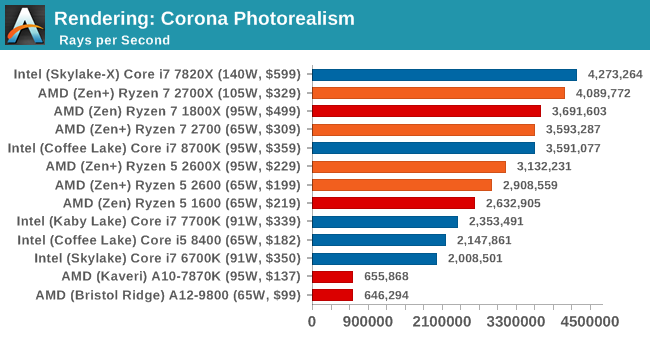
Blender 2.78: link
For a render that has been around for what seems like ages, Blender is still a highly popular tool. We managed to wrap up a standard workload into the February 5 nightly build of Blender and measure the time it takes to render the first frame of the scene. Being one of the bigger open source tools out there, it means both AMD and Intel work actively to help improve the codebase, for better or for worse on their own/each other's microarchitecture.
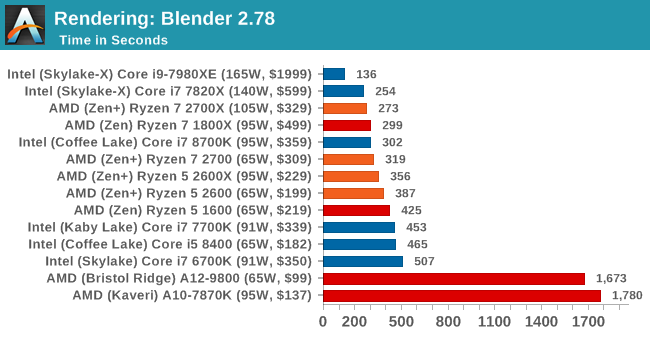
This is one multi-threaded test where the 8-core Skylake-based Intel processor wins against the new AMD Ryzen 7 2700X; the variable threaded nature of Blender means that the mesh architecture and memory bandwidth work well here. On a price/parity comparison, the Ryzen 7 2700X easily takes the win from the top performers. Users with the Core i7-6700K are being easily beaten by the Ryzen 5 2600.
LuxMark v3.1: Link
As a synthetic, LuxMark might come across as somewhat arbitrary as a renderer, given that it's mainly used to test GPUs, but it does offer both an OpenCL and a standard C++ mode. In this instance, aside from seeing the comparison in each coding mode for cores and IPC, we also get to see the difference in performance moving from a C++ based code-stack to an OpenCL one with a CPU as the main host.
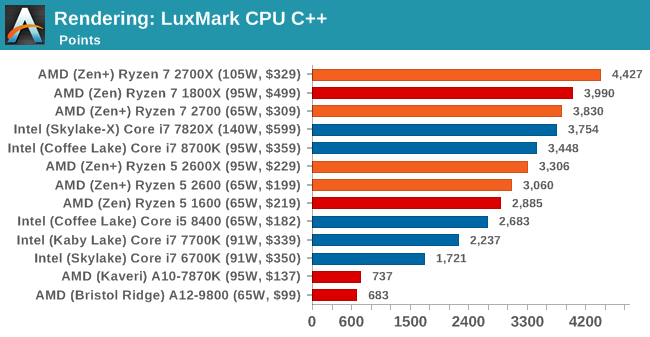
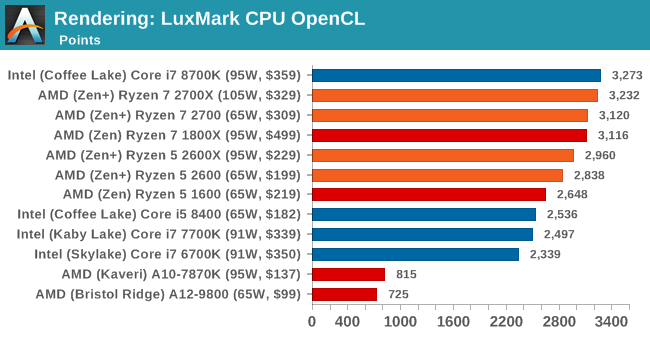
POV-Ray 3.7.1b4: link
Another regular benchmark in most suites, POV-Ray is another ray-tracer but has been around for many years. It just so happens that during the run up to AMD's Ryzen launch, the code base started to get active again with developers making changes to the code and pushing out updates. Our version and benchmarking started just before that was happening, but given time we will see where the POV-Ray code ends up and adjust in due course.

Cinebench R15: link
The latest version of CineBench has also become one of those 'used everywhere' benchmarks, particularly as an indicator of single thread performance. High IPC and high frequency gives performance in ST, whereas having good scaling and many cores is where the MT test wins out.
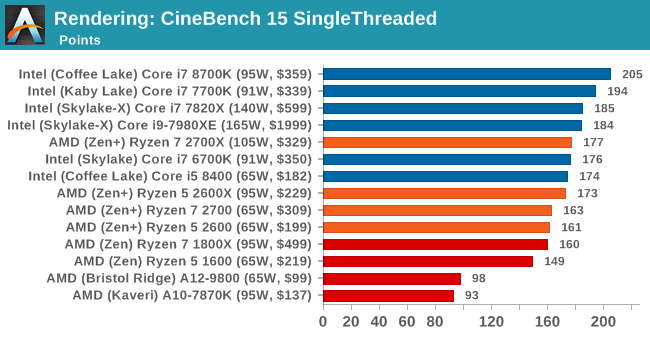
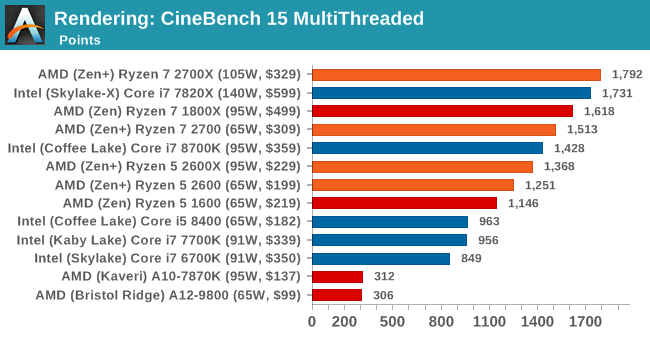
Intel is still the single thread champion in benchmarks like CineBench, but it would appear that the Ryzen 7 2700X is now taking the lead in the multithreaded test.










545 Comments
View All Comments
rocky12345 - Tuesday, April 24, 2018 - link
They ran all systems at both Intel's & AMD's listed specs as such AMD's memory was at 2933MHz on Zen+ & 2666MHz on Intel's Coffee lake 8700K,they did the same for the older gen parts as well and ran those at the spec's listed for them as well.There have been a few other media outlets that did the same thing and got the same results or very close to the same results. AMD's memory bandwidth as in memory controller seems to give more bandwidth than Intel's does at the same speed so with Intel not running at 3200MHz like most media outlets did maybe Intel loses a lot of performance because of that and AMD lost next to nothing from not going 3200MHz. It is all just guesses on my part at the moment.
Food for thought when Intel released the entire Coffee Lake line up they only released the z370 chip set which has full support for over clocking including the memory and almost all reviews were done with 3200MHz-3400MHz memory on the test beds even for the non K Coffee lakes CPU's. Maybe Intel knew this would happen and made sure all Coffee lakes looked their best in the reviews. For a few sites that retested once the lower tier chip sets were released the non K's using their rated memory speeds lost about 5%-7% performance in some cases a bit even more.
I am no fanboy of any company I just put out my opinions & theories that are based off of the information we are given by the companies and as well as the media sites.
Maxiking - Tuesday, April 24, 2018 - link
People never fail to amaze me, so you basically know nothing about the topic, yet you still managed to spit 4 paragraphs of mess, even made some "food for thought".Slower ram - performance regression unless you have big caches which is not the case of Intel nor AMD.
rocky12345 - Tuesday, April 24, 2018 - link
It seems pretty basic to me as to what was said in the post. It is not my problem if you do not under stand what myself and some others have said about this topic. Pretty simple slower memory less bandwidth which in turn will give less performance in memory intensive work loads such as most games. ALl you have to do is go and look at some benches in the reviews to see AMD has the upper hand when it comes to memory bandwidth even Hardware Unboxed was pretty surprised by how good AMD's memory controller when compared to Intel's. Yes Intel's can run memory at higher speeds than AMD but even with that said AMD does just fine. You are right about cache sizes neither has a overly large cache but AMD 's is bigger on the desktop class CPU's and that is most likely one of the reasons their bandwidth for memory is slightly better.Maxiking - Wednesday, April 25, 2018 - link
The raw bandwidth doesn't matter, it's cas latency what makes the difference here.https://www.anandtech.com/show/11857/memory-scalin...
https://imgur.com/MhqKfkf
With CL16, it doesn't look that much impressive, is it.
Now, lower the CL latencies to something more 2k18-ish, booom.
https://www.eteknix.com/memory-speed-large-impact-...
Another test
https://www.pcper.com/reviews/Processors/Ryzen-Mem...
Almost all the popular hw reviewers don't have a clue. They tell you to OC but do not explain why and what you should accomplish by overclocking. Imagine you have some bad hynix ram which can be barelly OC from 2666 to 3000mhz but you have to loose timing from CL15 for CL20 to get there.
mapesdhs - Monday, May 14, 2018 - link
schlock, the chips were run at official spec. Or are you saying it's AMD's fault that Intel doesn't officially support faster speeds? :D Also, GN showed that subtimings have become rather important for AMD CPUs; some mbds left on Auto for subtimings will make very good selections for them, giving a measurable performance advantage.peevee - Tuesday, April 24, 2018 - link
It is April 24th, and the page on X470 still states: "Technically the details of the chipset are also covered by the April 19th embargo, so we cannot mention exactly what makes them different to the X370 platform until then."jor5 - Tuesday, April 24, 2018 - link
The review is a shambles. They've gone to ground.coburn_c - Tuesday, April 24, 2018 - link
I have been wanting to read their take on x470..risa2000 - Wednesday, April 25, 2018 - link
It is my favorite page too.mpbello - Tuesday, April 24, 2018 - link
Today phoronix is reporting that after AMD's newest AGESA update their 2700X system is showing 10+% improvement on a number of benchmarks. It is unknown if on Windows the impact will be the same. But you see how all the many variables could explain the differences.